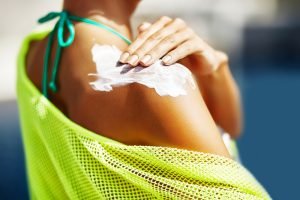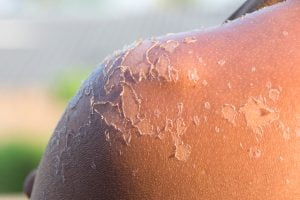Summer is right around the corner, and with the changing season comes glorious beach days, outdoor barbecues, swimming pools, flip-flops and lots of time spent under the sun with family, friends and loved ones. Although being outside and enjoying the warm weather is certainly one of the most exciting things about the Summertime, with the welcomed warmth also comes a host of unwelcome risks associated with excessive UV ray exposure. If you don’t protect your skin from the sun, you may end up suffering from sunburn (amongst many other issues) and feeling miserable while everyone else is having fun.
Thankfully, we’re here to save the day. Today, we share a wealth of information regarding keeping your skin safe this upcoming Summer season. So, if you’re on a mission to get your skin ready for the Summer, stick around and read on to find out more!
How To Keep Your Skin Healthy In Summer
Regardless of whether you’ll be spending your time enjoying parkside picnics or splashing it up out at sea, there are many habits you can adopt that are guaranteed to keep your skin healthy this upcoming Summer season. Some of our top tips include:
Avoid The Sun Between 10am and 3pm — The period between 10am and 4pm is often the hottest part of the day, and as such, it is advisable to avoid sun exposure during this time. Even if you’re just walking the dog or running errands, trying to stay out of the sun during these peak hours can do wonders for protecting your skin. If you must be out at this time, it is vital that you slather on a high quality sunscreen and protect yourself with sunglasses, a hat or any other form of protective clothing
Religiously Apply Sunscreen — Sunscreen is part of our everyday life when you live in Australia – a phrase which has been drilled into us for decades.… Yet so many of us fail to keep on top of our sunscreen routines, even during the Summertime. The Skin Cancer Foundation recommends a water-resistant, broad-spectrum sunscreen with an SPF of 30 or higher for any extended outdoor activity. While you’re at it, don’t forget to reapply sunscreen every two hours for consistent protection. However, there is an exception to the rule—if you’re sweating or swimming you need to apply more often, even if you are using water-resistant sunscreen.
Drink Plenty Of Water — Staying hydrated in the warmer months is especially important because increased exposure to sunlight absorbs the moisture from the skin leaving it dry and flaky. The pool you jump in to cool off from the sunlight may also cause dry skin thanks to chlorine in the water. Moreover, when it is warm, our bodies try to cool down through the natural process of sweating, which in turn can cause dehydration. All of this means that staying hydrated by drinking plenty (and we mean plenty) of water is absolutely vital in the Summertime.
Don’t Forget To Moisturise — Dry, dehydrated skin can leave you looking dull in the warmer months, making it so important to ensure that you keep up with your skincare and moisturising routine, especially if you are spending a lot of time in air-conditioned rooms. Artificially cooled rooms have dehumidified air, which dries your skin and can make facial wrinkles and fine lines look more pronounced. We recommend using a moisturiser with an SPF to provide an extra layer of protection. Just don’t put it on in the morning and think it can replace sunscreen all day.
Book an Appointment
How To Keep Skin Clear In Summer
Have you ever noticed yourself breaking out in pimples during the warmer months? The truth is, you’re not alone. Acne often rears its ugly head during the Summertime due to a number of different reasons. Most of the time, it’s related to increased oil production, sweating and more clogging of the pores that occur with the warmer temperatures. If you have acne-prone skin, this often means breakouts.
Dermatologists recommend the following tips to help prevent acne during the warmer months:
- Be sure to blot sweat from your skin with a clean towel or cloth every time you perspire. Avoid rubbing or wiping sweat off as this can irritate your skin, leading to even worse breakouts.
- Wash sweaty clothes, headbands, towels, activewear and hats before wearing them again.
- Use non-comedogenic products (skincare and makeup) on your face, neck, back, and chest. The label may also say “oil free” or “won’t clog pores.”

The Importance of Sunscreen
Sunscreen is one of the most critical elements in any skin care routine and rain hail or shine, should really be used daily — especially during the hot summer months. Regardless of whether it’s overcast, the sun’s damaging UV rays are still present everyday, making it vital for people of all ages to slather on some SPF before leaving the house everyday.
Men, women and children of all ages can significantly benefit from applying sunscreen every day and dramatically reduce the risk of developing skin cancer and melanomas, particularly during summer when these harmful UV rays are at their strongest. Unfortunately, excess exposure to the sun can cause:
- Pre-cancerous (actinic keratosis) and cancerous (basal cell carcinoma, squamous cell carcinoma and melanoma) skin lesions;
- Benign tumours;
- Fine and coarse wrinkles;
- Freckles;
- Discoloured areas of the skin, pigmentation;
- Sallowness — a yellow discoloration of the skin;
- Telangiectasias — the dilation of small blood vessels under the skin; and
- Elastosis — the destruction of the elastic and collagen tissue, causing lines and wrinkles.
Prevention is always easier than trying to reverse the effects of sun damage, so be sure to add a good sunscreen to your daily routine. Learn more about sunscreen safety for your skin here.

Common Misconceptions About Sunbathing and Sun Damage
-
You cannot burn or tan if the weather is cloudy or wet.
Unfortunately, this is false. UV light is able to penetrate clouds, which can cause sunburn even during cloudy days. Research even suggests that partially cloudy skies have raised the UV-B rays by 25% and increased DNA damage up to 40%! So yes! Cloudy days can actually be more dangerous for your skin!
-
You cannot burn if you are in the water.
Unbeknownst to many, you can actually get sunburned even more quickly when you’re swimming or boating because the reflection from the water makes the sun’s rays stronger. Thus, it is vital to slather on water resistant sunscreens every time you engage in watersports or swimming.
-
Umbrellas or large hats will prevent sun damage.
These are a help but do not replace a good sunscreen. Because umbrellas and hats provide limited protection against scattered and reflected UV radiation, you may still experience sunburn.
-
Wearing sunglasses helps prevent sun damage.
While wearing sunglasses is indeed a good idea in the Summertime, this is only true if the sunglasses contain UV filters and only if they are worn constantly while out.
-
I apply fake tan, so I don’t need to protect my skin from the sun.
Although using fake tan products is a great (and much safer) way to achieve that bronzed beach babe look – don’t be fooled when stepping out into the sun. Most tanning products do not offer protection against sunlight, so you still need to use sun protection and follow all of the safety tips as normal when you’re out in the sun.
Skin Treatments For The Summertime
If you’re seeing signs of sun damage on your skin there is a range of treatment options available at Victorian Cosmetic Dermal Clinics. We offer Photo Rejuvenation, an exciting procedure that can help dramatically reduce the appearance of pigmentation, freckles, rosacea, broken capillaries & sun damage. Depending on the skin damage Microdermabrasion, Chemical Peels or Low Intensity Laser Therapy may also be suitable options.
It is always best to seek professional advice before deciding on a treatment plan, so don’t be shy — head to our contact page today to book your initial consultation with one of our skin professionals.




